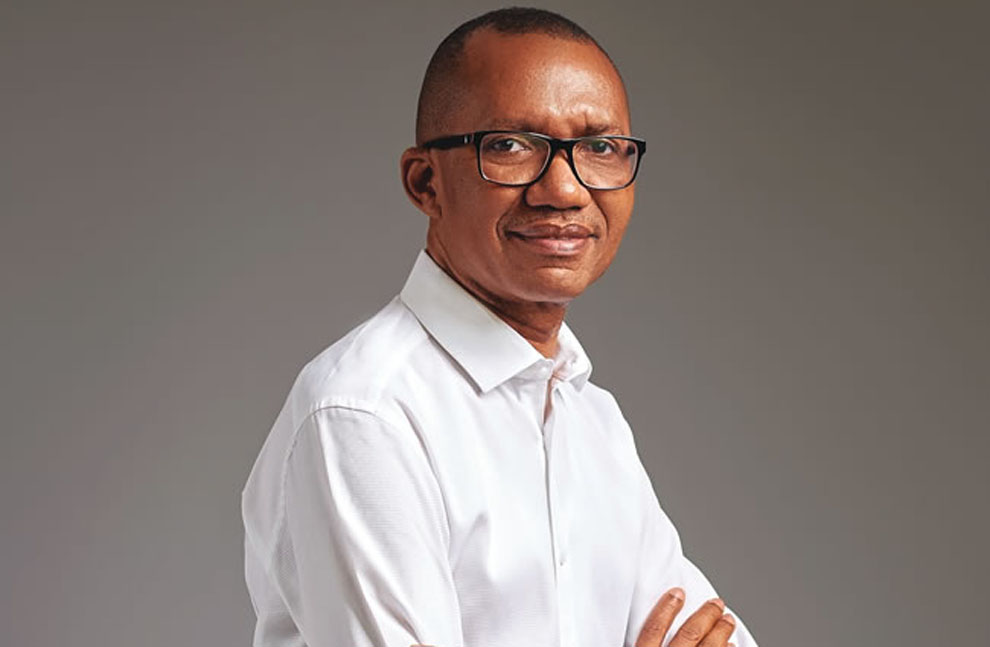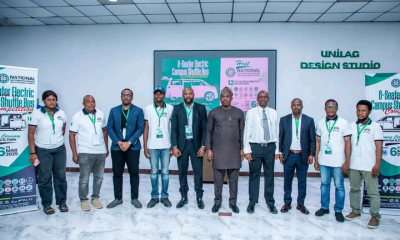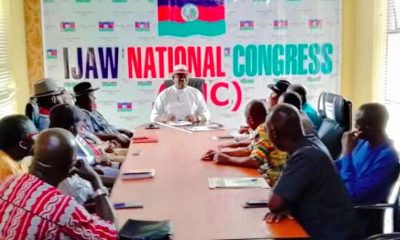Opinion
As Malagi and Ngelale renounce Lai’s lies and Adesina’s insults – Farooq Kperogi

As Malagi and Ngelale renounce Lai’s lies and Adesina’s insults – Farooq Kperogi
The Information and National Orientation Minister, Mohammed Idris Malagi, and the Special Adviser to the President on Media and Publicity, Ajuri Ngelale, started their jobs by inaugurating a refreshing and applaudable departure from the primitive information management strategies of their predecessors. But can they sustain the moral high ground they signposted in their initiatory speeches?
On his first day in office on August 1, Ngelale took deserved and carefully targeted potshots at the rude and crude informational tactics of his predecessors. “Gone forever, by the grace of God, are the days when government spokesmen and women would speak down to Nigerians, would use condescending language with Nigerians, and would display some form of institutional arrogance toward Nigerians,” he said. “That will NOT be tolerated under my leadership.”
His message resonated with a broad band of Nigerians, especially on social media, because since the return of civilian rule in 1999, Nigerians have come to associate incivility, crudity, arrogance, and insults with the job of presidential spokesmanship. To have a presidential spokesman disavow this template of relating with Nigerians is pleasantly surprising.
For his part, Malagi, in what seemed like a veiled dig at his immediate predecessor, assured Nigerians that lies and propaganda would no longer be instruments of information management. “This time around, a process of restoring popular confidence and trust in government and its policies shall not lie in the domain of propaganda,” he said. “In other words, the era of relying on propaganda to propagate government programmes is now over.”
This is music to the ears, especially coming after Lai Mohammed whose entire career as Minister of Information and Culture was defined by a bewilderingly extravagant fondness for willful and easily falsifiable lies. Lai’s first name doesn’t just share an uncanny phonemic kinship with “lie”; he actually embodied lies in the most audaciously disreputable way imaginable.
READ ALSO:
- 35-yr-old fake doctor nabbed during job interview at Covenant University
-
Niger’s military rulers kick out Nigerian, US, two other ambassadors
-
Groom faints as Bride dies during bridal shower a day to wedding in Oyo
All government information managers lie, but Lai’s lies were unmatched in their coarseness, brazenness, vulgarism, and disdain for the intelligence of Nigerians, which once caused me to wonder if he was the victim of a psychiatric disorder called “pseudologia fantastica” or “mythomania,” that is, chronically compulsive lying that causes liars to believe their own lies. A successor who repudiates this reputation is worthy of our attention.
I have written several past columns on the ineffectiveness of lies, intimidation, insults, and propaganda as means of official communication. In a February 28, 2015, column titled “Why Nigerian Politicians Now Prefer American Public Relations Firms,” for example, I wrote:
“Nigeria’s political public relations is crude, vulgar, and intellectually impoverished. No one who desires to change the hearts and minds of people should rely on it. Nigeria’s brand of political public relations, for the most part, does no more than attract enemies, scare away potential converts, and ossify negative opinions about candidates.
“It consists in barbarous, impulsive, sophomoric insults against real and imagined political opponents—and cloying, hagiographic defense of principals. It lacks nuance, is childish, and seems unconcerned with logic and persuasion.
“The performance of Reuben Abati and Doyin Okupe (who in fact describes himself as an ‘attack lion’)—and several others before them—in the defense of their bosses and the demonization of their bosses’ real and imagined political enemies is a classic example of the kind of primitive political public relations that holds sway in Nigeria. In this kind of political public relations, not only ‘political enemies’ come under heavy fire; facts, truth, and logic also become casualties.”
As spokesmen for Olusegun Obasanjo, Doyin Okupe and Femi Fani-Kayode trafficked in what I called an “unprecedented display of ill breeding and rudeness to our elders” and everyday Nigerians and “reckless and irresponsible juvenile bravado.”
Although Olusegun Adeniyi was urbane, responsible, polite, and guarded in the performance of his job as Umaru Musa Yar’adua’s spokesman, the ease with which he defended the obvious lies and fraud of the administration, especially in the last days of Yar’adua when governance basically ceased, made it difficult to take him seriously.
READ ALSO:
-
Ronaldo scores hat-trick, Mane twice for Al-Nassr
-
Abducted pastor mistaken for kidnapper, killed in Ogun forest by ‘security agents’
-
President Tinubu appoints Dekalu-Thomas electricity coy boss, director
Then Reuben Abati came and started the trend of inventing group slurs for critics of the government. He infantilized and pathologized critics of Goodluck Jonathan as “collective children of anger.”
Femi Adesina built on Abati’s collective slurring of critics. One of Adesina’s most notable “achievements” was the invention of a vacuous, unimaginative, and idiotic insult for critics of Muhammadu Buhari. He called them “wailing wailers.”
As I pointed out in past columns, “Wailing Wailers” is a historically positive term because it is one of the earliest names of the reggae band formed by Bob Marley, Peter Tosh, and Bunny Wailer in Jamaica. The band took the world by storm with the irresistibly lyrical force and anti-imperialist content of its music. It betrays a spectacular creativity deficit to insult your opponents with a term of esteem.
Outside its creative use as the name of a music band, “wailing wailer” is an unintelligent waste of words. It’s akin to saying “writing writers” or “singing singers.” It takes unbelievably remarkable stupidity to think that “wailing wailer” or “wailer” is an insult, but it bespeaks an even more astonishing height in the ignorance index to hurl it at an opponent and imagine you have done something great.
Most importantly, though, why should a presidential spokesperson who is paid from the public purse vituperate all critics of a government with a crude slur? What does that achieve?
Well, I can tell you what it achieves. It creates a condition psychologists call reactance. Reactance occurs when people are motivated to persist in or double down on an opinion or course of action that caused them to be threatened with insults.
For example, I didn’t set out wanting to be a Buhari critic. In fact, like previous presidents, I wanted him to succeed for the benefit of the entire country. When I started calling out his missteps in 2015 in the most sympathetic ways possible, I got unwarrantedly violent pushback from people who thought Buhari was worthy only of worshipful admiration and not even the mildest censure for even his most obvious infractions.
READ ALSO:
-
Protest rocks FUTA as final-year student slumps, dies few days to exam
-
Kremlin denies involvement in Wagner leader’s death, says its ‘absolute lie’
-
‘Never surrender’ — Donald Trump posts mugshot as he returns to X
The Buhari Media Center (BMC) was created to attack, smear, and libel me for merely daring to call out Buhari at a time when most people were scared of pointing out his weak points. But instead of cowing me, BMC’s attacks emboldened me and activated a motivational state of reactance that compelled me to reveal things about Buhari that I probably would have kept under wraps had BMC minions not set out to serially defame me for exercising my right to comment on the government.
Most critical, independent, self-aware people react the same way if their freedom of thought or action is violated with threats, insults, or other tools of emotional blackmail. In other words, it turns even fence-sitters into sworn enemies and hardens the opposition of opponents. The fact that Malagi and Ngelale appear to appreciate this elemental truth in persuasion and information management is admirable.
To my utter embarrassment, I had no knowledge of Ngelale until his appointment by Tinubu. I now know that he is a young man in his 30s (making him probably the youngest presidential spokesperson since 1999) who earned a political science degree from the University of Kansas in the United States in 2011 and had worked as Buhari’s Senior Special Assistant on Public Affairs (where he defended many indefensible things).
Perhaps, his youth, transnational experience, and awful experiences in the Buhari regime have helped to shape his new approach to interfacing with Nigerians.
Malagi’s position doesn’t surprise me. As I wrote in a casual May 18, 2022, article when he ran for APC’s governorship nomination in Niger State, I have known Malagi since the late 1990s when I worked for the Weekly Trust. He is by far the best credentialed minister of information that Nigeria has had in recent memory.
After teaching at a college of education for years, he ventured into public relations, advertising, marketing, and finally publishing. Apart from being the publisher of the Abuja-based Blueprint newspaper, he is also the proprietor of WE 106.5 FM Abuja, was general secretary of the Newspaper Proprietors’ Association of Nigeria (NPAN) and has been a major player in the Nigerian Institute of Public Relations (NIPR).
So, unlike past ministers of information, Malagi has deep intellectual and experiential familiarity with both public relations and journalism. Of course, this is no guarantee that he will succeed—or be better than his predecessors. Power both changes and reveals who people are. I know of no one who has remained the same after stepping foot in the corridors of power. I’ll be pleasantly shocked if Malagi is different.
For all you know, the praiseworthy words of Malagi and Ngelale may be no more than the ephemeral whispers of honeymoon sweet nothings. But the fact that they are unprecedented should invite us to pay attention and monitor how their actions match their words.
Farooq Kperogi is a renowned newspaper columnist and United States-based Professor of Journalism.
Opinion
Rivers State emergency rule: A different view by Azu Ishiekwene

Rivers State emergency rule: A different view by Azu Ishiekwene
President Bola Ahmed Tinubu’s proclamation of emergency rule in Rivers State on Tuesday surprised me for reasons different from those for which he has been severely criticised.
The mildest criticism is that Tinubu’s failure to call the Minister of the Federal Capital Territory, Nyesom Wike, to order was responsible for the crisis.
The more severe criticisms range from accusations that the President has subverted constitutional rule to charges of potential destabilisation at the behest of Wike.
A common point of agreement is that a civilian president should never have to declare emergency rule. That is the ideal.
But Rivers State before Tuesday presented a dire and complicated situation that stretched idealism to its elastic limits.
Chaos in slow motion
It’s convenient, especially for those who promoted and profited from the crisis, to pretend otherwise. Still, after the 27 state lawmakers loyal to Wike issued an impeachment notice, the outcome, if Governor Siminalayi Fubara had been impeached, might have been far worse for the state than can be contemplated under emergency rule. The proclamation was an unsolicited stitch in time.
If oil pipelines were already being blown up and militants deploying as the impeachment notice reached Fubara, what would have happened if the process had carried through? Rivers State has been chaos in slow motion for nearly two years, the only thriving business in the state being the politics of those who support Fubara and those who are against Wike.
The Supreme Court’s judgement invalidated the budget passed by Fubara and nullified the local government election. It affirmed the position of the 27 lawmakers, making Fubara’s government a lame duck. Emergency rule saved the governor from gunpoint, created a pause for the people to get their lives back, and made room for Wike and Fubara to stop and reflect. It’s a messy situation, but the counterfactual could have been worse.
READ ALSO:
- How Wande Abimbola rejected IBB’s ING bait, and other stories (1)
- Soldiers arrest 16 suspected oil thieves in Port Harcourt
- Controversial singer Portable apologises to Saheed Osupa over copyright dispute
Between Wike and Fubara
Popular media has framed Fubara as the victim of a grasping, unforgiving godfather, which suits his comportment. But during this inconvenient pause, it might be helpful for the governor to reflect on what he might have done differently, something that pressure by those egging him on for their narrow, selfish reasons might not have given him the space to do
President Bola Ahmed Tinubu’s proclamation of emergency rule in Rivers State on Tuesday surprised me for reasons different from those for which he has been severely criticised.
The mildest criticism is that Tinubu’s failure to call the Minister of the Federal Capital Territory, Nyesom Wike, to order was responsible for the crisis. The more severe criticisms range from accusations that the president has subverted constitutional rule to charges of potential destabilisation at the behest of Wike.
A common point of agreement is that a civilian president should never have to declare emergency rule. That is the ideal. But Rivers State before Tuesday presented a dire and complicated situation that stretched idealism to its elastic limits.
Chaos In Slow Motion
It’s convenient, especially for those who promoted and profited from the crisis, to pretend otherwise. Still, after the 27 state lawmakers loyal to Wike issued an impeachment notice, the outcome, if Governor Siminalayi Fubara had been impeached, might have been far worse for the state than can be contemplated under emergency rule. The proclamation was an unsolicited stitch in time.
If oil pipelines were already being blown up and militants deploying, as the impeachment notice reached Fubara, what would have happened if the process had been carried through? Rivers State has been chaos in slow motion for nearly two years, the only thriving business in the state being the politics of those who support Fubara and those who are against Wike.
READ ALSO:
- Bandits strike again in Benue, gun down 2 soldiers, 3 others
- UK announces new passport application fees starting April 2025
- Court lifts order stopping Senate probe on Natasha Akpoti
The Supreme Court’s judgment invalidated the budget passed by Fubara and nullified the local government election. It affirmed the position of the 27 lawmakers, making Fubara’s government a lame duck. Emergency rule saved the governor from gunpoint, created a pause for the people to get their lives back, and made room for Wike and Fubara to stop and reflect. It’s a messy situation, but the counterfactual could have been worse.
Between Wike and Fubara
Popular media has framed Fubara as the victim of a grasping, unforgiving godfather, which suits his comportment. But during this inconvenient pause, it might be helpful for the governor to reflect on what he might have done differently, something that pressure by those egging him on for their narrow, selfish reasons might not have given him the space to do.
In the public imagination, control of the state’s “political structure” is at the heart of the dispute between Fubara and Wike. Whether that is so, whether it’s about who the “authentic” party leader is, or it is more than what the public knows, Fubara and Wike know. We can only guess. But they both know.
Open War
The open war started after Fubara’s swearing-in when the governor wanted to install his candidate as speaker in the House of Assembly but failed. What was the point of demolishing the State House of Assembly complex built with hundreds of millions of naira of taxpayers’ money in December 2023 simply on the suspicion that the lawmakers were planning to impeach him there? Why did the governor think it was right to convene four of 31 lawmakers in his office to present the appropriation bill and then go on to implement it?
And why, after the peace deal brokered in Abuja, was it difficult for him to be his own man, free himself as the hostage of opportunistic local politicians and self-appointed opinion leaders and implement the decisions reached, instead of caving into busybodies in the People’s Democratic Party (PDP) whose primary interest is to continue the unfinished war of the 2022 Convention by other means?
Atiku could not have forgotten that when his boss did it again in Ekiti State two years later, it was mainly to facilitate Obasanjo’s hijack of the state for his political convenience, after lawmakers claimed to have impeached the governor. Fayose had become a thorn in his side, and he vowed to remove him by all means, fair and foul… Atiku may argue that he had been estranged from the government then and could not bear vicarious liability. However, he remained a part of the government until the end and must endure its glory and shame.
READ ALSO:
- Mohbad’s brother, Adura, arrested by police in Lagos
- UN staff member killed in central Gaza blast, five others injured
- Air Peace slashes Nigeria-London fare by N600,000
Atiku No 2 .
The PDP leadership and their cousins in Labour have never forgiven Wike for supporting Tinubu’s election. They have been quite loud in condemning the state of emergency. That’s their job as opposition. However, if the PDP is letting its testosterone rush get into its head and impair memory, we may need to remind the party how we got here.
Former Vice President Atiku Abubakar has been quite vocal in condemning emergency rule in Rivers State. In his earnestness, he has forgotten that the government in which he was the Number Two man had a shambolic record of infidelity to constitutional rule. And that is saying it nicely.
One can argue that President Olusegun Obasanjo’s proclamation of emergency rule in Plateau State in 2004, though controversial, was inevitable because of the horrific deaths caused by the sectarian violence, which led to reprisals in other states. Yet, former Governor Joshua Dariye’s suspected links to the crisis made his suspension inevitable.
Bayelsa’s Playbook!
Atiku could not have forgotten that when his boss did it again in Ekiti State two years later, it was mainly to facilitate Obasanjo’s hijack of the state for his political convenience, after lawmakers claimed to have impeached the governor. Fayose had become a thorn in his side, and he vowed to remove him by all means, fair and foul.
Atiku may argue that he had been estranged from the government then and could not bear vicarious liability. However, he remained a part of the government until the end and must endure its glory and shame.
Or perhaps he would have preferred the impeachment of Fubara from Obasanjo’s Bayelsa playbook? In that case, instead of an emergency rule, Tinubu would have provided a haven where the majority 27 lawmakers would have met under heavy security protection to remove the governor, as Obasanjo did under slightly different circumstances, in the case of former Governor Diepreye Alamieyeseigha.
Amaechi’s Forgotten Diary
Former Rivers State Governor Rotimi Amaechi, a longstanding foe of Wike, also weighed in, condemning the “power grab’s illegality.” He has a right to intervene and speak his mind. However, since he called the proclamation “an affront” to the rule of law and a power grab, it might be helpful to remind him of a typical, but by no means isolated, example from his record as governor.
The underlying currents may be similar – local politics gone rogue – but the consequences or potential consequences are not. Constitutional lawyers can debate the legal triggers because of the lack of clarity in Section 305 of the 1999 Constitution, compared with the 1960 Constitution, a pre-Republican document that gave the prime minister more expansive powers.
In 2013, when the position of chief judge in Rivers State was vacant, Amaechi appointed and swore in the president of the Customary Court of Appeal, Justice Peter Agumagu, against decency and the provisions of law. He joined issues with the National Judicial Commission (NJC), which was at its wit’s end to restrain him and keep him on the path of common sense. The state judiciary reeled under Amaechi’s blatant affront for one year, which he now conveniently forgets.
Apples and Oranges
Parallels have been drawn between the state of emergency in Rivers State and the one in 1962 during the Western Region crisis, especially as the latter was believed to have led the country down the slippery slope that eventually ended in the removal of the Tafawa Balewa government and the Civil War.
The underlying currents may be similar – local politics gone rogue – but the consequences or potential consequences are not. Constitutional lawyers can debate the legal triggers because of the lack of clarity in Section 305 of the 1999 Constitution, compared with the 1960 Constitution, a pre-Republican document that gave the prime minister more expansive powers.
While the emergency rule in the Western Region was mainly an opportunistic intervention by the federal government to undermine the Obafemi Awolowo-led opposition, the emergency in Rivers State was an inevitable step to prevent a potential descent into chaos, where the governor was not an innocent bystander.
Water in the Coconut
Since 1999, two administrations – Muhammadu Buhari’s and Umaru Yar’Adua’s being the only exceptions – have proclaimed emergency rule. Apart from 2013, when President Goodluck Jonathan left the governors of the three affected states in place because they had no link to the crises in their states, complicity has affected the scope of the application of emergency rule.
When Obasanjo threatened an emergency in Lagos, Tinubu said it was unacceptable because he was doing his best as governor to tackle the sectarian clashes in a small part of the state then. In Rivers, the governor is a part of the problem.
Those opposed to the proclamation should say how to leave Fubara in place and extract the water of peace from the coconut of Rivers State without breaking the shell on the head of the people.
Rivers State emergency rule: A different view by Azu Ishiekwene
Opinion
How Wande Abimbola rejected IBB’s ING bait, and other stories (1)

How Wande Abimbola rejected IBB’s ING bait, and other stories (1)
Tunde Odesola
(Published in The PUNCH, on Friday, March 21, 2025)
Embarrassment has no truer depiction than the guilt a debtor feels each time the string of his indebtedness twangs at his soul. I am talking about an honest debtor here. A sincere debtor feels sad whenever his inability to mend his broken promises nudges his conscience. He sincerely wishes to pay but cannot, yet.
However, the insincere debtor, hard like the shell of a tortoise, is unperturbed whenever he remembers his empty repayment promises. He blinks like a toad on a full stomach, “My lender knows times are hard. I cannot come and kill myself, jare. I will pay someday,” he says with malicious arrogance.
Despite living in a cutthroat world of credit facilities, I dislike borrowing. However, due to banking bottlenecks, I occasionally need a quick loan. When this arises, my mind will never be at rest until I pay it off. Whenever I’m indebted, the chiefest of my prayer points will be the grace not to die suddenly so I can pay up my debt and not carry someone’s money to the grave.
I always say this to my lender, “Uhmm, if I die today and you start crying, people will think you are crying for me, they won’t know you are crying for your money. You would come to my wake, look at my corpse and say in your mind, ‘Look at his big head! He has carried my money to heaven, idiot!’”
My lender would laugh and say, “Ha, you are not serious. You are not going to die now. Do not talk like that!”
But I talk like that because I know death lurks in the shadow of every mortal. I know each minute is a gift; each breath – a favour.
A jolly good friend of mine, Idowu Bailey, was born on Wednesday, November 14. Last month, Bailey, a giant, danced at a wedding anniversary shindig on a Saturday, visited his mechanic on Tuesday, spoke with a friend on Wednesday, and on Thursday, he died in the parking lot of his workplace, right inside the car with which his wife had taken him to work. Born in 1962, Bailey was 62 when he died. Bailey had a good heart and left a good impression of himself on everyone.
READ ALSO:
- Soldiers arrest 16 suspected oil thieves in Port Harcourt
- Controversial singer Portable apologises to Saheed Osupa over copyright dispute
- Bandits strike again in Benue, gun down 2 soldiers, 3 others
When he noticed our church pastor, Mr Peter Oyediran, had chosen the ‘Gorimapa’ hairstyle, which leaves no strand of hair on the head, Bailey presented a new set of clippers to the cleric, saying, “I observed you keep no hairs on your head nowadays. Here is a good set of clippers, sir.”
Debt. Since January last year, I have looked forward to writing a sequel to the series, “Wande Abimbola @ 91: How an àbíkú decided to live”, which I started in honour of the exemplary life of a former Vice Chancellor, Obafemi Awolowo University, Ile-Ife.
The series was a debt I felt I owed to the integrity, dedication, courage and excellence that define the grass-to-grace story of a village boy, who rose from the relics of the ancient Oyo Empire to peak at the academic mountains of Harvard University, Boston University, Amherst College, University of Louisville, Kentucky; Colgate University, Smith College, Massachusetts; and Great Ife, among others.
But I could not bring myself to do a follow-up on my series on Abimbola because Nigeria is a land of ‘one week, plenty troubles’. And, to remain in touch with readers, a columnist’s commentaries should sync with current affairs and realities.
Here’s a rundown of my articles between November last year and March, this year: the nation woke up to a member of the House of Representatives, Alex Ikwechegh, dehumanising and threatening to make a taxi driver disappear. A few days after this, a violence-encouraging video of the Alapomu of Apomu, Oba Kayode Afolabi, surfaced online, charging some members of the Peoples Democratic Party to take up arms during an election. Days apart, the story of Godwin Emefiele’s alleged 753-duplex estate broke, then Dele Farotimi wrote a book, and the Timi of Ede knelt to the Emir of Ilorin.
Along the way came the king of Orile-Ifo, Oba Abdulsemiu Ogunjobi, who threatened a 73-year-old man, Pa Arinola Abraham, with death. Later, IBB sold the most dishonest autobiography of all time. Then Bola Tinubu’s Lagos State House of Assembully replaced democracy with tyranny just before Senator Natasha Akpoti-Uduaghan dragged Senate President, Godswill Akpabio, to the virtual superhighway, accusing him of tailgating.
Each week I tried to go back to the Wande Abimbola story, a calamitous story broke in Naija. Just this week, a state of emergency was foisted on Rivers State by the Asiwaju of Nigeria.
Since life is but a walking shadow and Baba Abimbola is 92, I pushed the pause button on my editorial desk to celebrate the Awise while he is alive. More so, President Tinubu breathed a six-month lifespan into the nostrils of the emergency rule in Rivers, so I have enough time to come back and paddle my canoe on the Rivers of turbulence.
This series is a further exploration of Abimbola’s phenomenon as a beacon of good leadership, transparency in public office and religious fidelity.
READ ALSO:
- UK announces new passport application fees starting April 2025
- Court lifts order stopping Senate probe on Natasha Akpoti
- Mohbad’s brother, Adura, arrested by police in Lagos
To different people, Abimbola means different things. While many foreign religion worshippers call him a pagan, he is a hero to traditional religion adherents. Wande, the only surviving son of Iroko Abimbola, has spoken at the conclaves of world religious leaders, which included the Pope, upholding the truth of Ifa and radiating the essence of Yoruba culture and tradition.
Abimbola and the late MKO Abiola shared one thing in common. Both are abikus. “I am an abiku, who decided to stay after five comings. Abiola came 23 times before he chose to live.”
Abimbola and MKO met in the late 1960s at the Staff School of the University of Lagos. “I joined UNILAG as a senior research fellow in 1966 and I enrolled my children at the staff school. I took them to and fro the school. Abiola too was doing the same thing for his two children – Kola and his sibling. In the afternoon, we both got there before the school closed. It was while waiting for the school to close that we got talking. Abiola was an accountant with the International Telephone and Telegraph Corp,” the Awise Agbaye began.
He continued, “Abiola was a most jovial friend. He regularly visited me at my UNILAG house on Bode Thomas Street in Surulere, Lagos. When he comes, he would say, “Bàbá Àgbà, óò dè ní yòdí, óò dè ní béèrè énìkankan, óò dè je ka sere lo…,” exhorting me for not asking of him and urging me to let us go and hang out.
“Abiola told me he came from a very poor background and had to play a stringed musical instrument called ‘Osugbo’ to fend for himself. He loved me and I loved him, too. In 1972, I left UNILAG and went to Ife as a senior research fellow, so we lost contact temporarily. It was later, I began to read about him in newspapers and I began to wonder if it was the same Abiola who was my friend. One day, he sent an invite to me for the christening of his child. So, I went, and we reunited.
READ ALSO:
- UN staff member killed in central Gaza blast, five others injured
- Air Peace slashes Nigeria-London fare by N600,000
- Tinubu’s state of emergency prevented Fubara from impeachment – AGF
“I soon became the vice chancellor, and he would visit me for three or four days. His convoy would come late into the night, and I would lodge him in the chancellor’s lodge, which was behind my lodge. Anytime he visited, the domestic staff knew they had hit a jackpot because he would give them a huge sum of money that they all would share. After sharing, each worker would get as much as N5,000 when their salary was less than N200,” Abimbola said.
After the world-acclaimed scholar finished his two-term tenure of seven years as V-C (1982-1989), he tried his hands in politics, emerging a senatorial candidate of the Social Democratic Party in Oyo State after he was rigged out of the governorship race, which he said he won. Abimbola said the late Strong Man of Ibadan politics, Alhaji Lamidi Adedibu, and some other Oyo political leaders appeased him with a senatorial ticket. “They said they knew I won the primary but that they want an Ibadan son, Kolapo Ishola, to be the governor. After consultations with my people in Oyo, I accepted and worked for Ishola in Oyo.”
Abimbola won his senatorial election by a landslide. When the National Assembly convened, he emerged as the Senate Majority Leader, making him a leading Yoruba voice in national politics at the time.
No sooner had the Senate convened than the majority leader attracted enemies to himself when he single-handedly repelled the move by senators to determine and approve their salaries.
It was also in his direction that the Ibrahim Babangida military junta first looked when searching for who would head the Interim National Government – after annulling the June 12, 1993, presidential election won by Chief MKO Abiola.
“I was contacted twice to come and head the Interim National Government. I think they chose me because I was the highest-ranking Yoruba political office holder then. They probably thought if they chose me, that would assuage the feelings of the Yoruba. Four reasons made me reject the offer,” Abimbola said.
To be continued.
Email: tundeodes2003@yahoo.com
Facebook: @Tunde Odesola
X: @Tunde_Odesola
How Wande Abimbola rejected IBB’s ING bait, and other stories (1)
Opinion
Nasir El-Rufai’s scorched-earth one-man opposition, By Farooq Kperogi

Nasir El-Rufai’s scorched-earth one-man opposition, By Farooq Kperogi
Like a stranded mariner gasping on the shores of irrelevance, former Kaduna State governor Nasir Ahmad El-Rufai writhes in the uneasy throes of power’s withdrawal. His disquiet, however, is less the quiet lament of a fallen statesman and more the tempestuous fury of a Shakespearean woman scorned.
He has become fiery, irascible, indignant, and unrelenting in his public expressions of rage towards his former friends in power who have isolated him. He is throwing the kitchen sink at the power structures in Kaduna and Abuja in an all-out effort to extract vengeance and to ward off potential ensnarement.
The former cushy, self-satisfied, and illiberal denizen of power who was the scourge of dissenters railing against tyranny, now finds himself wielding the very defiance he once crushed with arrogance and malevolent glee. He has become an accidental insurgent (a la “accidental public servant”) forged in the crucible of his own contradictions.
There is a part of me that loves this new insurrectionary, rebellious, activist, and intensely irate one-man band opposition that El-Rufai has opportunistically transmogrified into.
For one, he is providing the first real opposition to the Bola Ahmed Tinubu administration. Every democracy needs the well-aimed slings and well-informed counsel of a sharp-witted opposition to keep its leaders from sinking into the depths of self-satisfaction and insouciance.
Say what you will about El-Rufai, but his intellect, erudition, and rhetorical dexterity are top-notch and undeniable. Imagine if figures of his political stature, institutional access, and strategic acumen had chosen to be thorns in the current corridors of power. Perhaps, the Tinubu administration would have thought twice before treating Nigerians with the cavalier disregard that has become its trademark in the last two years.
For another, he has an opportunity to experience what his critics went through when he was a governor for eight years. He abducted critics, caused opponents to be tortured, bragged about reducing politicians he has displaced to mere “bloggers,” instrumentalized the courts to squelch dissent, etc.
Now, he posts social media updates about his former commissioners being “abducted,” about the judiciary being weaponized against his supporters and his past administration, about the “misuse of federal security agencies in the persecution of opposition leaders,” etc.
READ ALSO:
- Osimhen scores hat-trick as Galatasaray demolish Antalyaspor
- My wife is a pastor, can’t be Bigot, Tinubu tells Catholic bishops
- Electricity: TCN blocks access to data from DisCos
Not only has El-Rufai become a “blogger,” once his favorite pejorative for social-media-active politicians he has dislocated in Kaduna, he has now plunged deeper into a lowly “content creator.” With the launch of a TikTok account, he’s gone from being a mere “blogger” to a digital hustler, complete with the undignified ritual of soliciting Nigerians to subscribe to his channel.
Yet, I am delighted that El-Rufai has joined our ranks. Professional “wailing wailers” like me (to use former presidential spokesman Femi Adesina’s agonizingly asinine and illiterate insult for government critics) welcome him to the club.
Nonetheless, my joy that he is inadvertently rendering a democratic service by the constancy and stridency of his strictures against the government has not blunted the acuteness of my awareness that he is an unbearably devious, self-seeking, hateful scoundrel who is only on a mission to avenge what he perceives as a personal affront to him.
As most people have already observed, had El-Rufai secured the minister of power position he was promised, his current antagonism toward the government would be as unimaginable as a cat lobbying for the rights of rats.
Not only would he have been a staunch defender of every government action, but he would have also directed his trademark vitriol at ordinary Nigerians suffocating under economic hardship. He would dismiss their grievances with characteristic scorn and cruelty.
Indeed, the same northern establishment he now courts and seeks to mobilize as a political cudgel would have been his favorite punching bag—just as it was in 2023, when he enthusiastically championed Bola Tinubu’s candidacy.
It takes an unnatural degree of slow-wittedness not to see that El-Rufai’s newfound disillusionment with the governments in Kaduna and Abuja reeks less of principle and more of a bruised ego nursing its wounds.
READ ALSO:
- Customs seize 1,149 jerry cans of petrol in Taraba
- 10 ex-Buhari’s ministers to dump APC for SDP
- FG refutes US Congress claim of terrorists targeting Nigeria’s Christians
In my July 27, 2019, column titled, “How Political Power Damages the Brain—and How to Reverse it,” I called attention to (temporarily) politically displaced whores of power like El-Rufai who pretend to identify with ordinary people in their moments of political trauma.
“Also look at previously arrogant, narcissistic, power-drunk prigs who have been kicked out of the orbit of power for any number of reasons. You’ll discover that they are suddenly normal again.
“They share our pains, make pious noises, condemn abuse of power, and identify with popular causes. The legendary amnesia of Nigerians causes the past misdeeds of these previous monsters of power to be explained away, lessened, forgiven, and ultimately forgotten. But when they get back to power again, they become the same insensitive beasts of power that they once were.”
Get El-Rufai back into power now or in 2017, he would be the same villainous backstabber he has always been. He would be the same annihilator of the homes of poor people. He would be the same horrid tormentor of critics.
In a September 20, 2019, article, I described him as “straight-up Nigeria’s most bigoted and most dangerous public official alive.”
El-Rufai’s latest political metamorphosis is less a transformation than a temporary realignment born of personal grievance rather than ideological conviction. His brand-new zeal for opposition, while inadvertently serving the democratic process, is unmistakably fueled by wounded pride and thwarted ambition.
The same man who once ruled with an iron fist, silencing critics with impunity, now fashions himself as the voice of the oppressed, railing against the very structures of power he once upheld with ruthless enthusiasm. His current posture as an anti-establishment crusader is not the product of principle but of exclusion, making his activism less an act of courage than an elaborate act of self-preservation.
Yet, even as he momentarily aligns with the forces of resistance, history warns against mistaking his opportunistic dissent for genuine reform. Should fortune return him to the corridors of power, El-Rufai would waste no time reverting to the autocratic instincts that have long defined him. He would crush opposition, weaponize state institutions, and wield power with the same reckless abandon that now makes him a pariah.
Today’s dissenter is often tomorrow’s despot. To embrace him uncritically is to risk aiding yet another cycle of tyranny dressed in the fleeting garb of rebellion.
Nasir El-Rufai’s scorched-earth one-man opposition, By Farooq Kperogi
Farooq Kperogi is a renowned columnist and United States-based Professor of journalism.
-

 International2 days ago
International2 days agoUK announces new passport application fees starting April 2025
-

 Auto3 days ago
Auto3 days agoLanre Shittu Motors offers support for EV bus design competition in universities
-

 metro3 days ago
metro3 days agoIbas: 18 things to know about Rivers administrator
-

 metro3 days ago
metro3 days agoSoldiers take over Rivers Government House after state of emergency declaration
-

 metro3 days ago
metro3 days agoPipeline explosion hits Bayelsa amid Rivers state emergency declaration
-

 metro2 days ago
metro2 days agoCourt lifts order stopping Senate probe on Natasha Akpoti
-

 metro17 hours ago
metro17 hours agoMore trouble brews in Rivers as Ijaw congress considers self-determination option
-

 metro2 days ago
metro2 days agoTanker explodes on Abuja bridge, many feared dead, 30 vehicles burnt



